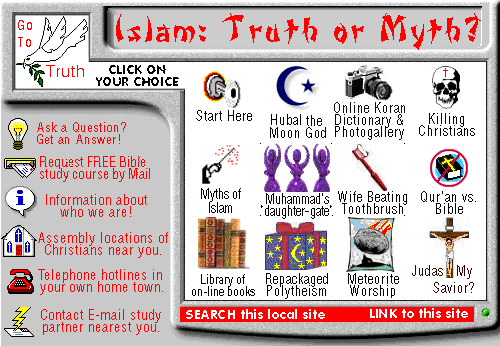Encyclopedia of Islam Myths:
The Islamic Myth that Muhammad did not found or invent Islam
 Muhammad was not a prophet of God but the inventor Islam. The religion of Islam simply did not exist anywhere in history prior to Muhammad. Inventing the myth that Jesus and Abraham were Muslims in the 600's AD is further proof that Islam, as practiced today, was conceived in the 7th century. Even this devout Muslim admits that Islam was unknown before Muhammad came along:
Muhammad was not a prophet of God but the inventor Islam. The religion of Islam simply did not exist anywhere in history prior to Muhammad. Inventing the myth that Jesus and Abraham were Muslims in the 600's AD is further proof that Islam, as practiced today, was conceived in the 7th century. Even this devout Muslim admits that Islam was unknown before Muhammad came along:
"SINCE WHEN IS ANYONE A MUSLIM? Islam began as a world religious movement in the first decade of the seventh century C.E. in the city of Makkah (Mecca) in Arabia. It was taught by Muhammad, son of 'Abdullah, of the tribe of Quaraysh and the clan of Hashim. When Muhammad was forty years old, he began to have visions in which God sent down a series of revelations through the Angel Gabriel. The revelations, recited in Arabic form, were a disclosure not of God, but of His will or commandments." (Islam, Isma'il R. Al Faruqi 1984, p13-14, Muslim)
Other notes and Quotes:
Was Muhammad a prophet? He was a man in whom creative imagination worked at deep levels and produced ideas relevant to the central questions of human existence, so that his religion has had a widespread appeal, not only in his own age but in succeeding centuries. Not all the ideas he proclaimed are true and sound, but by God's grace he has been enabled to provide millions of men with a better religion than they had before they testified that there is no god but God and that Muhammad is the messenger of God. (Muhammad: Prophet and Statesman, W. Montgomery Watt, 1961, p229-235)
If it is true, as we are often told, that Christianity is Christ, there is also a sense in which it is true that Islam is Muhammad. It was from his preaching in seventh-century Arabia that the religion got its start. Its Scripture, the Qur'an, bears the impress of his mind, with its enthusiasms and its limitations, from the first page to the last. The sunna enshrined in the corpus of Traditions, both canonical and uncanonical, is from one point of view nothing more than an attempt to get Muhammad's personal authority as backing for every detail of public or private conduct. In this sense it is an attempt to provide the faithful Muslim with material for an imitatio Muhammedis more far-reaching in its consequences than any imitatio Christi has ever been. (Islam: Muhammad and His Religion, Arthur Jeffery, 1958, p 3-4)
WAS MUHAMMAD A PROPHET? ... I would begin by asserting that there is found, at least in some men, what may be called ' creative imagination '. Notable instances are artists, poets and imaginative writers. (Muhammad: Prophet and Statesman, W. Montgomery Watt, 1961, p229-235)
Once established in Madina, Muhammad became less a preacher and prophet than a community leader and man of state, and we witness that curious change of character which develops steadily until his death from a wasting fever in 632. (Islam: Muhammad and His Religion, Arthur Jeffery, 1958, p 3-4)
In Muhammad, I should hold, there was a welling up of the creative imagination, and the ideas thus produced are to a great extent true and sound. It does not follow, however, that all the Qur'anic ideas are true and sound. In particular there is at least one point at which they seem to be unsound. The idea that 'revelation' or the product of the creative imagination is superior to normal human traditions as a source of bare historical fact. There are several verses in the Qur'an (II. 5I; 3. 39; I2. I03) to the effect that 'this is one of the reports of the unseen which We reveal to thee; thou didst not know it, thou nor thy people, before this '. One could admit a claim that the creative imagination was able to give a new and truer interpretation of a historical event, but to make it a source of bare fact is an exaggeration and false. (Muhammad: Prophet and Statesman, W. Montgomery Watt, 1961, p229-235)

Go To Start: WWW.BIBLE.CA

![]() Muhammad was not a prophet of God but the inventor Islam. The religion of Islam simply did not exist anywhere in history prior to Muhammad. Inventing the myth that Jesus and Abraham were Muslims in the 600's AD is further proof that Islam, as practiced today, was conceived in the 7th century. Even this devout Muslim admits that Islam was unknown before Muhammad came along:
Muhammad was not a prophet of God but the inventor Islam. The religion of Islam simply did not exist anywhere in history prior to Muhammad. Inventing the myth that Jesus and Abraham were Muslims in the 600's AD is further proof that Islam, as practiced today, was conceived in the 7th century. Even this devout Muslim admits that Islam was unknown before Muhammad came along: